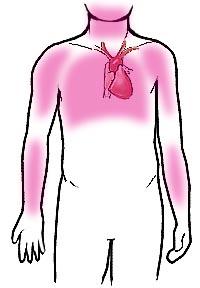“What Are The Signs And Symptoms Of Heart Valve Problems?” Asks Donna
By Adam Pick on April 26, 2009
I just received an interesting email from Donna about the signs and symptoms of heart valve problems.
Donna writes, “Adam – I was diagnosed with moderate mitral regurgitation over five years ago. Since then, I have annual check-ups to make sure the valve doesn’t get any worse. The strange part is that I’ve had no symptoms since diagnosis. Yesterday, however, I lost my breath while walking up a hill during my weekly hike. As I’m 63-years young, I’m curious to know if this is a sign or symptom that my heart valve problem is getting worse. Any thoughts? Donna”

Like Donna, I was primarily asymptomatic prior to my double heart valve surgery. I only experienced one symptom related to my problematic heart valve disorder. That said, it is critical for all patients to continuously monitor their heart valve problems through annual echocardiograms. While heart valve problems can be identified via stethoscopes, the echocardiogram is the medical standard for evaluating valve disease over time.
In addition to echocardiograms, there are several signs and symptoms that a patient can continuously “look out for” in between yearly visits to the cardiologist. According to The Cleveland Clinic, here are some of the most common signs and symptoms of valve problems:
- Shortness of breath or difficulty catching your breath. You may notice this most when your are active (doing your normal daily activities) or when you lie down flat in bed. You may need to sleep propped up on a few pillows to breathe easier.
- Heart palpitations. This may feel like a rapid heart rhythm, irregular heart beats, skipped beats or a flip-flop feeling in your chest.
- Swelling of your ankles, feet or abdomen. This is called edema. Swelling may occur in your belly, which may cause you to feel bloated.
- Weakness or dizziness. You may feel too weak to carry out your normal daily activities. Dizziness can also occur, and in some cases, passing out may be a symptom.
- Quick weight gain. A weight gain of two or three pounds in one day is possible.
- Discomfort in your chest. This may feel like a pressure or weight in the chest with activity or going out in cold air.
If you notice an elevation of these signs and symptoms of heart valve problems (e.g. aortic stenosis or mitral regurgitation), please contact your cardiologist. As we have previously discussed, it is critical for you or your caregivers to be proactive and prevent significant worsening of your valve disorder.
So you know, I missed one annual echocardiogram. During that time, my aortic stenosis shifted from moderate-to-severe status and my heart began to dilate (enlarge). Luckily, after surgery, my heart is performing well and no longer dilated. But, please do not let this happen to you!
I hope this helps explain more about the signs and symptoms of heart valve problems.
Keep on tickin!
Adam
|
Joe says on April 26th, 2009 at 7:24 pm |
|
My doctor watched my moderate aortic stenosis for several years hoping it would be stable for some time. I had almost no symptoms except occasional shortness of breath, which at 55, I figured was probably normal. But to my dismay, my regular echo last November showed things had progressed rapidly to a severe stage. My cardiologist said I needed to consider valve replacement within six months before any irreversable damage was done. I was told that once things get to that point, it’s like a snowball picking up speed going downhill. It gets worse much more quickly. After a second opinion (at Cleveland Clinic) confirmed the problem, I had the surgery on Dec. 29th and I’m feeling great! No more shortness of breath while doing any simple tasks. No – it wasn’t just a symtom of getting older. It was a severe problem that needed taken care of. IF YOU HAVE ANY QUESTIONABLE SYMTOMS, HAVE THEM CHECKED OUT. BETTER SAFE THAN SORRY WHEN IT COMES TO YOUR HEART! Good luck, Donna! |
 |
|
Katie Brown says on April 26th, 2009 at 8:04 pm |
|
It is a comfort every time I read your blog as I also face aortic valve surgery in the future. When I see your emails, I feel like you and your other friends truly understand what I feel. After losing 85 pounds, my cardiologist could really hear my murmur. He walked me over for my echocardiogram which showed almost moderate problems. However, you and my internist talked me off the ledge. I’ll keep looking forward to your blog. |
 |
|
linda says on April 27th, 2009 at 11:12 am |
|
Hi Adam |
 |
|
Penny says on May 2nd, 2009 at 3:46 pm |
|
I have been having somewhat the opposite problem. I was recently diagnosed with a bicuspid aortic valve after having experienced all of the symptoms mentioned for valve problems. I have been through a number of heart tests, including two echocardiograms, and have been told that the valve is still working fine and I shouldn’t need surgery for some time. I am still having all the symptoms though and am exhausted all the time. Any suggestions on what I should do next? |
 |
|
Melissa Johnston says on May 3rd, 2009 at 8:01 pm |
|
My cardiologist & several others chose to believe that I was asymptomatic even though I continually said that I got out of breath very easily. My biggest advice would be to trust how you’re feeling and if you don’t think things are right get them checked out further. My stenosis went from a pressure gradient of in the 30’s to over 60 (ie needing surgery) in the period between my regular cardiologist visits, it was only because I had taken myself back to see him because I didn’t feel right – my breathlessness had go to the point where I would totally avoid stairs and any hill or the slightest incline because it was just too uncomfortable to walk up them. It’s now 1 yr since my surgery and I am feeling good. Nobody knows your body like you do, it’s your health and you need to take great care with it. |
 |













